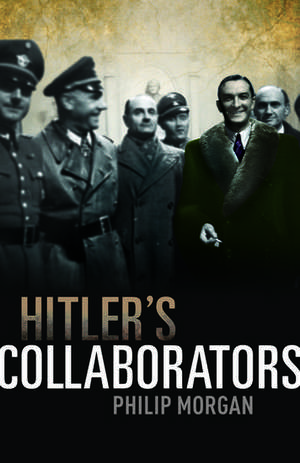Hitler's Collaborators: Choosing between bad and worse in Nazi-occupied Western Europe
Autor Philip Morganen Limba Engleză Hardback – 14 iun 2018
Preț: 142.29 lei
Preț vechi: 180.18 lei
-21% Nou
Puncte Express: 213
Preț estimativ în valută:
27.23€ • 28.37$ • 22.54£
27.23€ • 28.37$ • 22.54£
Carte disponibilă
Livrare economică 03-10 martie
Livrare express 27 februarie-05 martie pentru 75.77 lei
Preluare comenzi: 021 569.72.76
Specificații
ISBN-13: 9780199239733
ISBN-10: 0199239738
Pagini: 384
Ilustrații: 11 black and white illustrations
Dimensiuni: 161 x 235 x 34 mm
Greutate: 0.64 kg
Editura: OUP OXFORD
Colecția OUP Oxford
Locul publicării:Oxford, United Kingdom
ISBN-10: 0199239738
Pagini: 384
Ilustrații: 11 black and white illustrations
Dimensiuni: 161 x 235 x 34 mm
Greutate: 0.64 kg
Editura: OUP OXFORD
Colecția OUP Oxford
Locul publicării:Oxford, United Kingdom
Recenzii
meticulously researched ... Hitler's Collaborators takes a much-needed fresh look at the complexities of collaboration during the Nazi era.
Collaborating with an occupying power is a tangled skein of complex motives: opportunism, survival, fear, a sense of professional responsibility. That is Morgan's subject in this solid and accessible account of Germany's occupation of western Europe from 1940 to 1944 and the occupation's reverberations in the various countries of Europe. Morgan (Univ. of Hull, UK) moves carefully and thoroughly, country by country. He examines not only governmental officials in powerful positions but also bureaucrats, businessmen, educators, and others who played a critical role in supplying the Nazi war machine.
The reader is left wanting to know more about how the changing course of the war influenced the calculations of state officials and industrialists. More might also have been said about the relationship between resistance and collaboration. Morgan sometimes presents the relationship in binary terms: collaboration or resistance. Yet considerable space conceivably existed between the two, and one way to probe this space is to examine not only the constraints operating on officials and industrialists, but also their room for maneuver.
A subject as contentious and divisive as the Nazi occupation of wartime Europe deserves a historian of Philip Morgan's stature... Hitler's Collaborators is meticulously researched. There is a wealth of empirical detail, much of which demonstrates the complexities of the interaction between business and politics in a fraught wartime situation.
In Hitler's Collaborators: Choosing between Bad and Worse in Nazi-Occupied Western Europe, Philip Morgan provides an essential synthesis of wide-ranging Nazi occupation policy across Western Europe from a base of secondary sources in several languages.
Collaborating with an occupying power is a tangled skein of complex motives: opportunism, survival, fear, a sense of professional responsibility. That is Morgan's subject in this solid and accessible account of Germany's occupation of western Europe from 1940 to 1944 and the occupation's reverberations in the various countries of Europe. Morgan (Univ. of Hull, UK) moves carefully and thoroughly, country by country. He examines not only governmental officials in powerful positions but also bureaucrats, businessmen, educators, and others who played a critical role in supplying the Nazi war machine.
The reader is left wanting to know more about how the changing course of the war influenced the calculations of state officials and industrialists. More might also have been said about the relationship between resistance and collaboration. Morgan sometimes presents the relationship in binary terms: collaboration or resistance. Yet considerable space conceivably existed between the two, and one way to probe this space is to examine not only the constraints operating on officials and industrialists, but also their room for maneuver.
A subject as contentious and divisive as the Nazi occupation of wartime Europe deserves a historian of Philip Morgan's stature... Hitler's Collaborators is meticulously researched. There is a wealth of empirical detail, much of which demonstrates the complexities of the interaction between business and politics in a fraught wartime situation.
In Hitler's Collaborators: Choosing between Bad and Worse in Nazi-Occupied Western Europe, Philip Morgan provides an essential synthesis of wide-ranging Nazi occupation policy across Western Europe from a base of secondary sources in several languages.
Notă biografică
Philip Morgan is now Senior Fellow at the University of Hull, after a career lecturing in contemporary European history in the Departments of European Studies and History at the University of Hull. His previous publications include Italian Fascism, 1919-1945 (Palgrave Macmillan, 2003), Fascism in Europe, 1919-1945 (Routledge, 2002), and The Fall of Mussolini: Italy, the Italians, and the Second World War (2007), which was also published by Oxford University Press.
